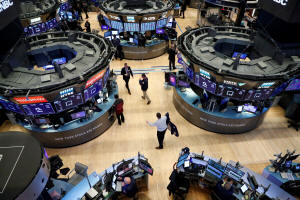Analysis-'Few places to hide': investors seek shelter as stocks, bonds
fall together
 Send a link to a friend
Send a link to a friend
 [February 18, 2022] By
Davide Barbuscia [February 18, 2022] By
Davide Barbuscia
NEW YORK (Reuters) - Lockstep declines in
bonds and stocks are sending investors into defensive products such as
credit swaps, convertibles and even cash as they seek refuge from the
market’s recent gyrations.
BlackRock Inc's iShares iBoxx $ Investment Grade Corporate Bond ETF has
fallen by nearly 7% year-to-date to its lowest level since April 2020,
as expectations of higher interest rates and persistent inflation dim
the allure of bonds across the fixed-income spectrum.
That is in line with losses across major stock indexes, which have also
been hit by worries of tighter Fed policy. The S&P 500 has dropped 7.3%
year-to-date and the Nasdaq Composite is down by about 11%.
The side-by-side tumbles have dealt another blow to a decades-old
strategy that relied on a mix of bonds and stocks to take the sting out
of equity declines, with bond prices ideally moving higher during
periods of stock market volatility.

"It's very difficult right now because there's just very few places to
hide," said Jordan Kahn, president and chief investment officer at ACM
Funds in Los Angeles.
The search for defensive products comes amid worries of more volatility
across asset markets, as an expected 150-175 basis points in rate
increases over the next year threatens to further buoy bond yields and
weigh on stock valuations.
Yields on the benchmark 10-year US Treasury, which sway borrowing costs
across the credit spectrum, are up 50 basis points this year, to their
highest level since August 2019. Bond prices move inversely to yields.
"Widening spreads and volatility have certainly brought back interest to
products that had been basically sleepy for the past few years,” said
Alfonso Peccatiello, a former portfolio manager who now authors a
financial newsletter and advises institutional investors.
For some investors, anticipation of more wild swings in asset prices has
heightened the appeal of credit swaps, which are used to ensure against
the risk of corporate defaults.
The Markit CDX North American Investment Grade Index, a basket of credit
default swaps that serves as a gauge of credit risk, widened over 17
basis point to 64 basis points this year, its highest level since
September 2020.
[to top of second column] |

Traders work on the floor of the New York Stock Exchange (NYSE) in
New York, U.S., March 19, 2020. REUTERS/Lucas Jackson

Matt Smith, investment director at British fund manager Ruffer Investment
Management, said he did not have any corporate credit in his portfolio but owns
"quite a lot" of credit default swaps.
"Credit is ... vulnerable to either yields going up, or central bank
accommodation falling back, or flows out of credit, meeting quite an illiquid
market. To us, it looks like the worst of all worlds", he said.
Michael Miller, president and chief investment officer of Wellesley Asset
Management, an investment firm specializing in convertible bonds, said demand
for such instruments - which allow holders to convert bonds to their underlying
equities - has been on the rise.
Miller said they have almost always outperformed other asset classes such as
U.S. equities or traditional fixed-income instruments during periods of
inflation in the last 50 years.
"This rather forgotten asset class all of a sudden has been getting a lot of
attention all over again," he said.
The SPDR Bloomberg Convertible Securities ETF, an exchange-traded fund that
provides exposure to the market of U.S. convertible securities, has climbed 0.3%
this month.
Kahn, of ACM Funds, increased exposure late last year to an ETF that moves
inversely to Treasuries to hedge against higher rates, as well as to hybrid
instruments linked to the energy transportation industry.
He is also relying on a more traditional strategy for uncertain times: cash. The
cash balance in his portfolio now stands at its highest level since March 2020,
when the pandemic wreaked havoc on markets.
"Right now I think that we're in a market where just preserving capital is more
important than seeking return on capital", he said.
(Reporting by Davide Barbuscia in New York; Editing by Ira Iosebashvili and
Matthew Lewis)
[© 2022 Thomson Reuters. All rights
reserved.]This material may not be published,
broadcast, rewritten or redistributed.
Thompson Reuters is solely responsible for this content.
 |